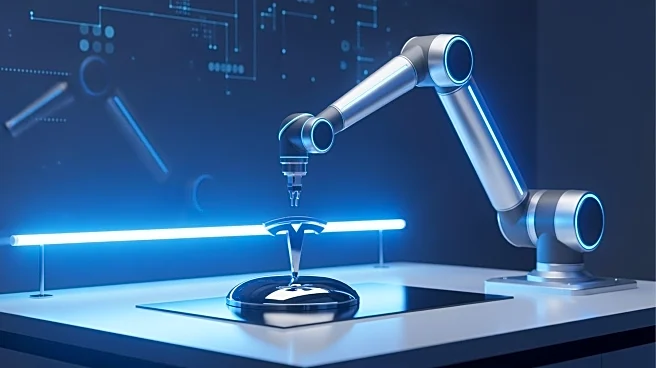What's Happening?
Elon Musk, the CEO of Tesla, is seeking to expand his control over Tesla's growing robotics and artificial intelligence ventures. Tesla, traditionally known for its electric vehicles, is being positioned by Musk as a leader in robotics and AI, with ambitions
to reach a market value of $20 trillion. Musk's plans include the delivery of 20 million cars, launching one million robotaxis, and producing one million Optimus humanoid robots. A significant financial incentive for Musk is a potential $1 trillion pay package over the next decade, contingent on meeting these ambitious targets. However, Musk has expressed concerns about potential interference from shareholder advisory firms ISS and Glass Lewis, which he referred to as 'corporate terrorists.' These firms influence institutional investors' voting decisions, which could impact Musk's control over Tesla.
Why It's Important?
The expansion of Tesla into robotics and AI represents a significant shift in the company's strategic direction, potentially transforming it from an automotive manufacturer into a tech conglomerate. This move could have wide-reaching implications for the tech and automotive industries, potentially setting new standards for innovation and market competition. Musk's concerns about shareholder advisory firms highlight the tension between corporate governance and visionary leadership. If Musk's plans succeed, Tesla could redefine the landscape of both the automotive and robotics industries, potentially leading to significant economic and technological advancements. However, the influence of advisory firms could pose challenges to Musk's control, affecting the company's strategic decisions and future growth.
What's Next?
Tesla shareholders are expected to vote on Musk's proposed pay package in November, which will be a critical moment for the company's future direction. The outcome of this vote could either empower Musk to pursue his ambitious goals or limit his influence if shareholders heed the advisory firms' recommendations. The decision will likely be closely watched by investors, industry analysts, and competitors, as it could signal the level of support for Musk's vision. Additionally, the development and deployment of Tesla's robot workforce will be monitored for its impact on labor markets and regulatory environments.
Beyond the Headlines
Musk's vision for Tesla extends beyond traditional automotive manufacturing, potentially influencing broader societal and ethical considerations. The deployment of a large-scale robot workforce raises questions about job displacement, privacy, and the ethical use of AI. As Tesla advances in these areas, it may face increased scrutiny from regulators and the public, necessitating transparent and responsible innovation practices. The company's success in navigating these challenges could set precedents for other tech companies venturing into similar fields.















